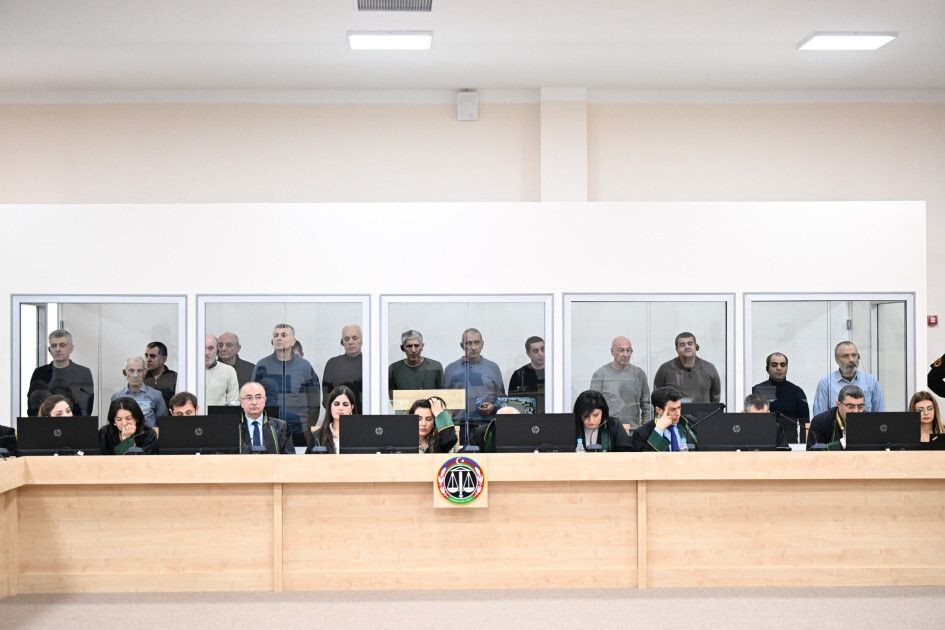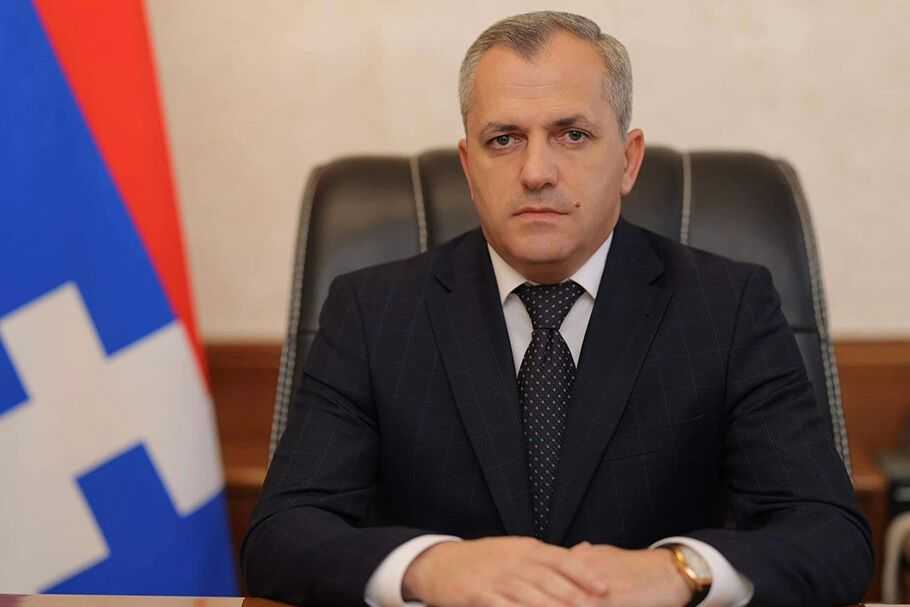
On 17 January, the cases of former officials and other representatives of Nagorno-Karabakh imprisoned in Azerbaijan began in court.
The first hearing of 15 Armenians, including ex-officials, took place last Friday and was presided over by Judge Zeynal Aghayev of the Baku Military Court.
The defendants have been accused of committing a total of 2,548 crimes, including genocide, slavery, enforced disappearance of persons, torture, financing of terrorism, and the creation of a criminal association.
Azerbaijani state media have dubbed the trials the ‘Nuremberg trials’ — an allusion to the trials which were held by Allied forces against the representatives of Nazi Germany following the end of World War II.
According to RFE/RL, the trial was ostensibly intended to be held publicly, but the initial preparatory hearing on 17 January proceeded behind closed doors. Only the main state-run media outlet AzTV and the state news agency AZERTAC were allowed to attend the hearing.
The Azerbaijani government was represented by six prosecutors, while the Azerbaijani victims were represented by Rufat Mammadov, the head of the Cabinet of Ministers. More than 531,000 victims, including missing persons from the First Nagorno-Karabakh War and their families, as well as their representatives, are involved in the criminal case.
According to Azerbaijani state media, all the accused Armenians were provided with translators and lawyers.
During the court process on Tuesday, the lawyer for one of the defendants, David Babayan, a former Nagorno-Karabakh Foreign Minister and presidential adviser, filed a motion requesting a confidential meeting with his client. The judge granted Babayan’s lawyer's motion and announced a break for a confidential hearing.
After the break, the lawyers of most of the defendants motioned to replace the preventive measure in the form of detention with house arrest.
Apparently preempting arguments from the defence about a supposed lack of appropriate healthcare services, one of the victims’ lawyers asserted that the pre-trial detention facilities had sufficient capabilities.
The reason for Babayan’s motion to be placed under house arrest was not specified.
APA also reported that Arayik Harutyunyan, Nagorno-Karabakh’s former president and another defendant in the case, said that neither his lawyer nor he filed a motion to place him under house arrest.
At the same time, APA’s reporting on the trial distorted Harutyunyan’s statements about Armenia’s shelling of the Azerbaijani city of Ganja during the Second Nagorno-Karabakh War, claiming that he had said, ‘I gave the order to shell Ganja with missiles’.
During his speech, Harutyunyan made a statement in which he said that he regrets his statement regarding the missile strike on Ganja during the 44-day war, but added additional context.
‘There is an opinion among the Azerbaijani people that I gave this order. I did not make this decision. Yes, I had a statement regarding this incident. I regret and apologise for this statement. I did not have such a right, such authority, or such an opportunity to express my opinion. I explained why I made this statement in the past in my statement during the investigation’.
The next court hearing will be held on 27 January, during which decisions on the petitions regarding house arrest will be announced.
Vardanyan’s defence team provided with 10 additional days
On the same day, the initial hearing of former Nagorno-Karabakh State Minister Ruben Vardanyan was held. Vardanyan’s lawyer filed two motions concerning the case.
The first motion, which requested that Vardanyan’s case be joined with the cases against 15 other Armenians, was rejected. The second petition, which asked the prosecution to grant the defence additional time to familiarise themselves with the materials of the criminal case, was satisfied, and 10 additional days were provided.

In late December, Vardanyan’s lawyer announced that there were ‘some 45 potential charges’ against his client. If found convicted of those charges, Vardanyan could face life imprisonment. The lawyer also noted that Azerbaijan ‘refused to provide copies of the alleged evidence to Vardanyan and counsel, who are currently only allowed to review these materials without a proper translation and at limited times’.
Marie Struthers, Amnesty International’s Eastern Europe and Central Asia Director, stated the same day that the Azerbaijani authorities ‘must uphold and ensure the fair trial rights’ of Vardanyan.
‘Ruben Vardanyan has raised serious allegations of human rights violations which include ill-treatment in detention, being coerced to sign falsified case materials and denied the opportunity to prepare his defence. Authorities must promptly, thoroughly, independently, impartially, and effectively investigate these grave allegations and bring to justice those suspected to be responsible,’ Struthers said.
Vardanyan’s next hearing will also take place on 27 January.
‘It is obvious what is happening’
Despite the significant amount of public attention the trial has attracted in both Armenia and Azerbaijan, the Armenian government has so far avoided making any official statements.
Last Friday, Azerbaijan published images from the trial, which was the first time that photos of most of the Armenian prisoners have been publicly distributed since their arrest in September 2023.
Armenians were shocked by the poor physical state of the prisoners, many of whom looked visibly emaciated.

On Wednesday, during a Q&A session at the parliament, Prime Minister Nikol Pashinyan commented on the trial, noting that the information they had learned and the scenes they saw ‘are worrying’.
‘This issue remains present in our diplomatic contacts, on our diplomatic agenda, and we will continue working in this direction to achieve results. Our primary task is to avoid harm and focus on achieving concrete outcomes’, Pashinyan said.
When asked at a press briefing on Tuesday if the Armenian government was following the trial, Parliamentary Speaker Alen Simonyan said ‘there is nothing to respond to’.
‘It is obvious what is happening. It is sad, let’s hope that after the trial, it will give an opportunity to somehow bring these people back, to have a discussion about their release’, Simonyan said.
On 17 January, Rustam Bakoyan from the ruling Civil Contract party expressed his ‘deep concern’ over the ‘prolonged detention’ in response to reports of poor conditions in jail during the ongoing trials in Baku.
He also noted that he would hold meetings with experts and Red Cross representatives ‘to assess the current situation and clarify what needs to be done’.
Anahit Manasyan, the Human Rights Defender of Armenia, has stated that all legal processes in Azerbaijan related to the Armenian prisoners ‘are taking place in gross violation of universal principles and values of human rights, as well as international legal standards’.
As the trial began, a group of people, including other former Nagorno-Karabakh officials, held a demonstration near the UN’s Armenia office, demanding the UN’s ‘intervention to achieve the release of all Armenian prisoners held in Azerbaijan’, Armenpress reported.










